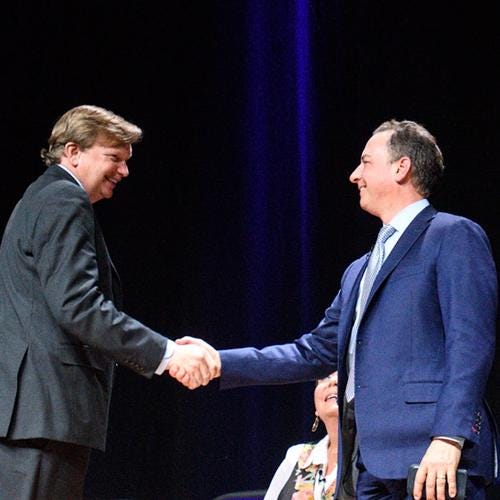
Common Ground has been one of Hamilton’s biggest misses in the past two years, closely following Charli XCX headlining last year’s Class & Charter Day. Still, the event continues to bring in huge names in politics — this time it was Obama’s Deputy Chief of Staff Jim Messina and Trump’s former Chief of Staff Reince Priebus. Yet it has consistently failed to live up to its billing.
Whether it was Karl Rove and David Axelrod or Condoleezza Rice and Susan Rice, the pairings featured so far for Common Ground have shown that the only thing party leaders can find common ground on is the need for common ground. If that sounds exhausting that’s because it is. As you might expect, the initial excitement around the event has all but evaporated, something that was very evident in the Field House on Thursday evening.
When Karl Rove and David Axelrod came to campus in October of 2017, the energy in the room and on campus was palpable. Every seat was filled as students, faculty, and the Clinton community waited to see if some of Bush and Obama’s top men could see eye-to-eye on the major political issues tearing the nation apart after the 2016 election. Unfortunately, they avoided any potential points of disagreement, instead choosing to deliver platitudes about the polarized political climate — a trend that would continue through the second iteration of Common Ground.
As a result, students had all but given up on the series by the time Messina and Priebus arrived, a fact that was seemingly confirmed by the glaring number of empty seats in the Field House. For a while, it seemed as if this third installment of Common Ground would be no different from the first two.
Jackie Judd P’14, a veteran journalist of many major news outlets, moderated the event. The role of the moderator is easily underrated in these panels, as it is their questions that guide the panel and it is their responsibility to drive an engaging debate. Judd initially seemed destined to make the same mistakes of her predecessors. Her opening questions were generalities about the nature and origins of polarization and trust in politics. As a result, the discussion dragged on with familiar sentiments from each side. Both Messina and Priebus lamented the idea that party lines made voters and elected officials resistant to compromise.
Judd prodded Priebus on President Trump’s impact on the current political climate, to which Priebus responded that the President would like nothing more than to give the “middle finger” to his opponents, but that he is cognizant of the fact that “he can’t divide himself down to nothing.” Priebus did not defend Trump’s methods unconditionally, which made it difficult for Messina to disagree or debate because they were not talking about any real issues. Again, it was that same theme of simply agreeing on the need for common ground, without actually finding any.
That all changed when Judd introduced the “Speed Round.” Her idea was to list off some major issues in politics, each person having to explain where they could find common ground with the other side. Her first offering: healthcare. You could feel the energy in the room shift with the mention of that word: everyone sat up straight, intent on seeing if the two men could actually deliver on the promise that the Common Ground series makes. Messina offered up prescription drug reform as a potential mode of compromise to which Priebus readily agreed.
However, Priebus then turned the conversation on its head by saying he couldn’t “believe we can’t find common ground on immigration.” He said the Democrats would be foolish to not accept some type of wall — whether it was a physical wall, drones, electronic, or some other form — because the facts clearly show we have a problem at our southern border. That set Messina off. The conversation quickly devolved into a shouting match, with each man cutting each other off in the effort to produce their own facts on immigration.
Unfortunately, Judd cut them both off just as we were beginning to get a look into how Congress and the White House actually operate. They moved rapidly over climate change and sensible gun laws, while both men were perhaps a little embarrassed over their outburst. Messina reiterated his hope for legislation on both issues, while Priebus maintained that those controversial issues would not “move the electorate.”
In the end, it was Priebus who saved the event. He understood that many of his views were unpopular in the room and played off that. Multiple times he blamed the electorate and the crowd, rather than Washington, for the lack of movement on hot-button issues. While Messina and even Judd were fairly blatant in their disapproval of President Trump’s tactics, Priebus walked a fine line between supporting Republican ideology and wholeheartedly justifying the President’s behavior. Twice, he referenced Trump’s “middle finger” to the establishment, yet he also told the heartwarming story of Trump’s first visit to the oval office.
By the end of the night, it almost felt like Priebus was searching for common ground with the crowd, rather than with Messina, because in his eyes that is where change must start. Judd’s final task for the two former White House officials was to give the people hope. Messina said that there is “more of a consensus on some issues than ten years ago,” while Priebus believes the “day is coming” where Americans will be able to work together again.
Hopefully the day is also coming where a Common Ground event can model the kind of heated debate Jim Messina and Reince Priebus gave us for that stirring two minutes.

















